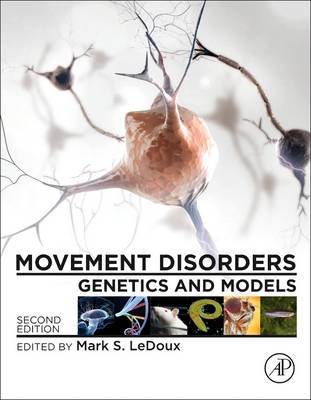
Movement Disorders
Academic Press Inc (Verlag)
978-0-12-405195-9 (ISBN)
- Titel ist leider vergriffen;
keine Neuauflage - Artikel merken
The use of animal models is a key aspect of scientific research in numerous fields of medicine. Movement Disorders, Second Edition vigorously examines the important contributions and application of animal models to the understanding of human movement disorders, and serves as an essential resource for basic neuroscientists engaged in movement disorders research. Academic clinicians, translational researchers and basic scientists are brought together to connect experimental findings made in different animal models to the clinical features, pathophysiology and treatment of human movement disorders.
The book is divided into sections on Parkinson's disease, Huntington's disease, dystonia, tremor, paroxysmal movement disorders, ataxia, myoclonus, restless legs syndrome, drug-induced movement disorders, multiple system atrophy, progressive supranuclear palsy/corticobasal degeneration, and spasticity. This book serves as an essential resource for both clinicians interested in the science being generated with animal models and basic scientists studying the pathogenesis of particular movement disorders.
Mark S. LeDoux, MD, PhD is a physician-scientist at the University of Tennessee Health Science Center. At present he holds a joint appointment as Professor in the Departments of Neurology, and Anatomy and Neurobiology. He specializes in the neurological subspecialty of movement disorders and treats patients at the University of Tennessee Medical Group and Memphis VA hospital. As an active clinical researcher, Dr. LeDoux’s work has focused on the genetics and treatment of dystonia, Parkinson disease and Huntington disease. He has described Huntington disease in a nonagenarian and reported one of the world’s largest pedigrees with HDL2. In the laboratory, Dr. LeDoux has published extensively on the genetics and molecular biology of dystonia, mechanisms of cell death in Parkinson’s disease, animal models of dystonia and autism, and the neuroanatomy of motor systems. His work with the dt rat engendered paradigm shifts in dystonia and motor systems research. Dr. LeDoux’s lab showed that familial and sporadic adult-onset primary dystonia may be associated with rare sequence variants in THAP1 and CIZ1.
Section I. Scientific Foundations
Section II. Parkinson Disease
Section III. Dystonia; Dystonia: Phenotypes and Genetics
Section IV. Huntington Disease
Section V. Tremor
Section VI. Myoclonus
Section VII. Tics
Section VIII. Paroxysmal Movement Disorders
Section IX. Tauopathies
Section X. Other Parkinsonian Syndromes: NBIA, MSA, PD+spasticity, PD+dystonia
Section XI. Ataxias
Section XII. Hereditary Spastic Paraplegia
Section XIII. Restless Legs Syndrome
| Verlagsort | San Diego |
|---|---|
| Sprache | englisch |
| Maße | 216 x 276 mm |
| Gewicht | 2760 g |
| Themenwelt | Medizin / Pharmazie ► Medizinische Fachgebiete ► Neurologie |
| Naturwissenschaften ► Biologie ► Genetik / Molekularbiologie | |
| ISBN-10 | 0-12-405195-2 / 0124051952 |
| ISBN-13 | 978-0-12-405195-9 / 9780124051959 |
| Zustand | Neuware |
| Haben Sie eine Frage zum Produkt? |
aus dem Bereich


